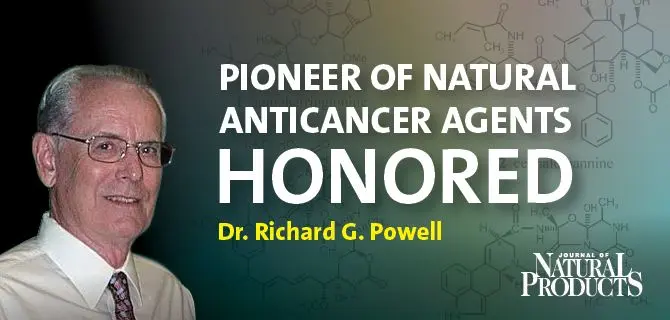
October 24, 2025 | This article appears in Volume 61, Issue 3

ASP member Richard (Dick) G. Powell, a long-time associate editor of the Journal of Natural Products and an outstanding phytochemist, passed away in May 2025 at the age of 86. He was a retired research leader at the National Center for Agricultural Utilization Research, Peoria, IL, where he worked for 31 years. Powell served as associate editor with great acumen for a total of 23 years, from 1991 through 2013. In recognition of his outstanding editorial service, he was named on the journal masthead page as “Honorary Editor” from 2014-2015. Powell was very capably aided by his late wife, Rosemary, as his editorial assistant during his tenure.
When Powell first became associate editor of Journal of Natural Products there were only six issues per year. However, the journal began to appear monthly in 1992, although hard-copy submission rather than electronic submission continued for several years thereafter. I well remember on taking over from Dr. Jim Robbers as the journal’s editor-in-chief in 1994 that one of the objectives of our office was to dispatch each Friday a large envelope via US mail containing three printed copies of each of several recently received submitted manuscripts for Powell to evaluate editorially. In this capacity as associate editor, I found him to be fair and open minded, someone who would always provide a sound judgement on the merits of a particular manuscript under consideration. Moreover, he was very conscientious in handling his editorial assignments in a very timely manner.
Three colleagues whose own tenures as Journal of Natural Products associate editors overlapped with that of Dick Powell have kindly provided their individual impressions of his work. Dr. David G.I. Kingston (Department of Chemistry, Virginia Tech), associate editor (1984-1998) and book review editor (1979-2002), said: “I remember Dick Powell as a wonderful scientist and an astute co-associate editor of the Journal of Natural Products. I first came to know of him from his reputation as the senior co-discoverer of homoharringtonine, which was later developed as the anticancer drug omacetaxine mepesuccinate. My admiration and respect for him deepened as we overlapped as associate editors of Journal of Natural Products from his beginning in 1991 until I retired from this position in 1998; he continued until 2013. He was assisted by his wife, Rosemary, and together they did much to raise the quality of the journal. We would meet each year at the ASP annual meeting, and it was there that I was able to appreciate him as the good and honorable man that he was.”
“I remember Dick Powell as a wonderful scientist and an astute co-associate editor of the Journal of Natural Products. I first came to know of him from his reputation as the senior co-discoverer of homoharringtonine, which was later developed as the anticancer drug omacetaxine mepesuccinate."--David Kingston
Dr Cedric J. Pearce (Mycosynthetix, Inc., Hillsborough, NC), associate editor from 2011-2024 and present Journal of Natural Products executive editor, commented: "Dick and I overlapped as associate editors for a short period, but during that time both he and his wife, Rosemary, were kind and helpful getting me onboard with the journal. As well as being grateful for the time he spent giving helpful advice, I couldn't help being impressed with the contributions Dick had made to natural product medicines especially as a result of the discovery of homoharringtonine (subsequently approved as an antileukemic drug) for which he was both proud and humble. I was so sorry to learn he had passed away.” Finally, Dr. Phil Proteau (Oregon State University), associate editor (2009-2019) and editor-in-chief (2020-2024) stated briefly: "Although I interacted with Dick minimally during our overlap as associate editors, I fondly remember his ready smile and insightful advice. He will be missed."
In the October 2015 issue of the Journal of Natural Products, an editorial was published to honor the outstanding scientific and editorial record of Powell (Horwitz, S.B. and Kinghorn, A.D., J. Nat. Prod. 2015,78, 2317-2318). This referred to the proceedings of a symposium held in Powell’s honor at the annual meeting of ASP held at Copper Mountain, CO in the summer of 2015. In this symposium, a historical introductory talk was provided by Powell on how homoharringtonine and related alkaloids were isolated from the plant Cephalotaxus harringtonia and then subjected to initial biological evaluation. Additional presentations were made at the symposium by Drs. David Kingston, Susan Mooberry, and David Newman (with the last-mentioned talk coauthored by the late Gordon Cragg).
Homoharringtonine was first reported from Cephalotaxus harringtonia by Powell and his colleagues at Peoria in 1970 and, as omacetaxine mepesuccinate (Synribo®), in 2012 was approved as an antileukemic agent by the US FDA. While this unfortunately was withdrawn recently from the US market due to manufacturing issues, Dr. Barry O’Keefe (Natural Products Branch, National Cancer Institute, Frederick, MD) was highly complementary on the positive impact the introduction into cancer chemotherapy this discovery had. He stated: “Omacetaxine mepesuccinate’s approval by the FDA in 2012 for the treatment of relapsed chronic myelogenous leukemia (CML) through an accelerated approval and Orphan Drug status was a lifeline for CML patients with few other options at the time. As a first-in-class natural product, with a unique mechanism of action (protein translation inhibition) that targeted short-lived proteins such as the Bcr-Abl chimeric kinase, omacetaxine provided another important example of the power of natural products to both define productive molecular targets and make important contributions to clinical oncology.”
Accordingly, Richard Powell made a very positive impact indeed as both a natural products scientist and as a journal associate editor. On a personal level, he was always very pleasant and highly approachable. His numerous positive contributions to our field will long be remembered. ![]()
